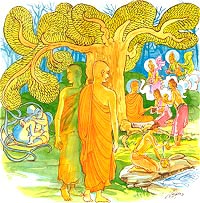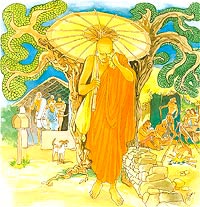19 06 2012 TUESDAY LESSON 642 FREE ONLINE eNālāndā Research And Practice UNIVERSITY And THE BUDDHISTONLINE GOOD NEWS LETTER by ABHIDHAMMA RAKKHITA through http://sarvajan.ambedkar.org
Dhammapada: Verses and Stories 209, 210 and 211-Tayojanapabbajita Vatthu-Admiration of Self-Seekers-
Not Seeing The Liked And Seeing The Unliked Are Both Painful-
Not Bound By Ties Of Defilements
families involved in manual scavenging in the country.

Verse 209. Admiration of Self-Seekers
One makes an effort where none’s due
with nothing done where effort’s due,
one grasps the dear, gives up the Quest
envying those who exert themselves.
Explanation: Being devoted to what is wrong, not being devoted
to what is right, abandoning one’s welfare, one goes after pleasures
of the senses. Having done so, one envies those who develop themselves.
 |
Verse 210. Not Seeing The Liked And Seeing The Unliked Are Both Painful
Explanation: Never associate with those whom you like, as |
 |
Verse 211. Not Bound By Ties Of Defilements
Explanation: Therefore, one must not have endearments; because |
Dhammapada Verses 209, 210 and 211
Tayojanapabbajita Vatthu
Ayoge yunja’mattanam
yogasminca ayojayam
attham hit va piyaggahi
piheta’ttanuyoginam.
Ma piyehi samaganchi
appiyehi kudacanam
piyanam adassanam dukkham
appiyananca dassanam.
Tasma piyam na kayiratha
piyapayo hi papako
gantha tesam na vijjanti
yesam natthi piyappiyam.
Verse 209: He who does what should not be done and fails to do what should be
done, who forsakes the noble aim of life (i.e., Morality, Concentration and
Insight) and grasps at sensual pleasure, covets the benefits gained by those who
exert themselves (in meditation).
Verse 210: Do not associate with those who are dear, and never with those who
are not dear to you; not seeing the dear ones is painful, and seeing those who
are not dear to you is also painful.
Verse 211: Therefore, one should hold nothing dear; separation from the loved
ones is painful; there are no fetters for those who do not love or hate.
The Story of Three Ascetics
While residing at the Jetavana monastery, the Buddha uttered Verses (209),
(210) and (211) of this book, with reference to a trio, consisting of a father,
a mother and a son.
Once in Savatthi, the only son of a family first became a bhikkhu; the father
followed suit and finally, the mother also became a bhikkhuni. They were so
attached to one another that they rarely stayed apart. The family stayed in the
monastery as if they were in their own house, talking and eating together, thus
making themselves a nuisance to others. Other bhikkhus reported their behaviour
to the Buddha and he called them to his presence, and said to them, “Once
you have joined the Order, you should no longer stay together like a family. Not
seeing those who are dear, and seeing those who are not dear to one, are both
painful; so you should not hold any being or anything dear to you”.
Then the Buddha spoke in verse as follows:
|
Verse 209: He who does what should not be done and |
|
Verse 210: Do not associate with those who are |
|
Verse 211: Therefore, one should hold nothing VOICE OF SARVAJAN According to the Census data, there are 7.5 lakh A book on manual scavenging, Adrishya Bharat (Invisible India: A “The Census Legislation
Problem of manual scavenging existed even in States which are otherwise Journalist Bhasha Singh, “The issue of manual scavenging is deeply related to “It is such a shame that in
|